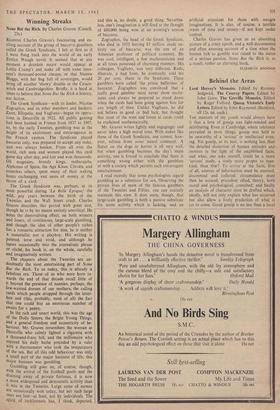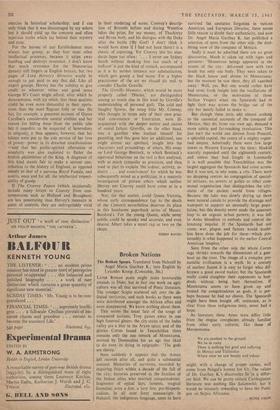Behind the Arras
Lord Hervey's Memoirs. Edited by Romney Sedgwick. The Creevey Papers. Edited by John Gore. The Greville Memoirs. Edited by Roger Fulford. Queen Victoria's Early Letters. Edited by John Raymond. (Batsford, all 12s. 6d. each.) THE mentors of my youth would always have it that a love of gossip was light-minded and debilitating. Even at Cambridge, where tolerance prevailed in most things, gossip was held to be unworthy of a 'serious' or intellectual even- ing. Yet gossip, at its best, is nothing less than the detailed dissection of human attitudes and motives in the light of the established facts; and what, one asks oneself, could be a more `serious' study, a study more proper to man- kind, than that? To arrive at the facts, first of all, sources of inforthation must be assessed, discounted and collated; circumstance must then be noticed, precedent sifted, theory, both moral and psychological, consulted; and finally an analysis of character must be drafted which, ideally, will not only explain what has occurred but also allow a lively prediction of what is yet to come. Good gossip is no less than a local
exercise in historical scholarship; and I can only think that it was discouraged by my ushers lest it should yield up the concrete and often injurious truths which lay behind their mystery and state.
For the barons of any Establishment must always fear gossip, as they fear most other intellectual processes, because it strips away humbug and destroys reverence. 1 don't know that much reverence for the Hanoverian dynasty still lingers in English breasts; but two pages of Lord Hervey's Memoirs would be enough to put paid to any that did. Like all expert gossips, Hervey has the subtlety to give credit to whatever virtue and good sense George II's Court might afford; after which he demonstrates, with icy relish, that these qualities could be even more distasteful in their opera- tions than the most flagrant folly or vice. He has, for example, a generous account of Queen Caroline's considerable mental abilities and her reason for hiding them from the public (she felt it impolitic to be suspected of heterodoxy in religion); it then appears, however, that her talents were put to the sole service of her love of power—power in its dreariest manifestations —and that her public-spirited affectation of simplicity was also exploited to flatter the brutish philistinism of the King. A diagnosis of this kind stands fair to make a serious con- tribution to the history of England, as opposed merely to that of a parvenu Royal Family, and asserts, once and for all, the intellectual respect- ability of gossip.
If The Creevey Papers (which incidentally include many letters to Creevey from con- temporaries such as Holland and Brougham) are less penetrating than Hervey's memoirs in point of analysis, they are unforgettably vivid in their rendering of scene. Creevey's descrip- tion of Brussels before and during Waterloo takes the prize, for my money, of Thackeray and Byron both; and his dialogue with the Duke after the battle (Ty God! I don't think it would have done if I had not been there') is a classic of reporting. Yet Creevey Iets his stan- dards lapse too often : `. . I never see Sydney Smith without thinking him too much of a buffoon' is just the kind of remark, accompanied as it is by neither instance nor substantiation, which gets gossip a bad name. For a higher practitioner of the art we should do well to consider Charles Greville.
The Greville Memoirs, which would be more properly called 'Diaries,' are distinguished among so much else in this kind by Greville's understanding of personal guilt. The cold and haughty Sporus, the smug little Mr, Creevey, who thought in terms only of their own prac- tical convenience or frustration, were ill- acqUainted with the deeper nature and causes of moral failure. Greville, on the other hand, was a gambler who loathed himself for gambling, and this gave him an additional, one might almost say spiritual, insight into the characters and proceedings of others. His essay on Lord George Bentinck, in which Bentinck's equivocal behaviour on the turf is first analysed, with as much sympathy as precision, and then used in part to explain 'the ardour, activity, in- dustry . . and contrivances' for which he was subsequently noted as a politician, is a masterly investigation of private ethics which neither Hervey nor Creevey could have come at in a hundred years.
Nor, for that matter, could Queen Victoria, whose early correspondence (up to the death of the Consort) nevertheless deserves its place in this handsome paperback series of Messrs. Batsford's. For the young Queen, while never subtle, could be spunky and accurate, and even dearest Albert takes a smart rap or two on the chops.
SIMON RAVEN



































 Previous page
Previous page